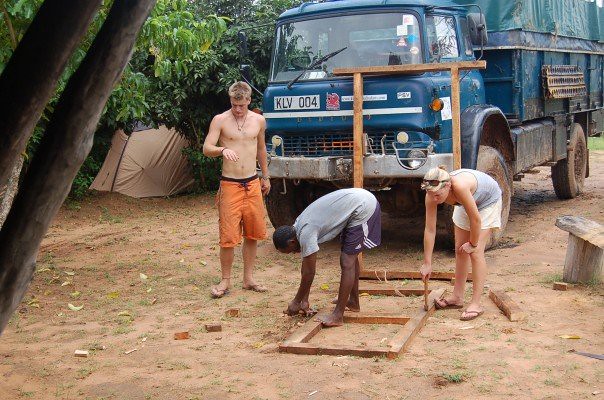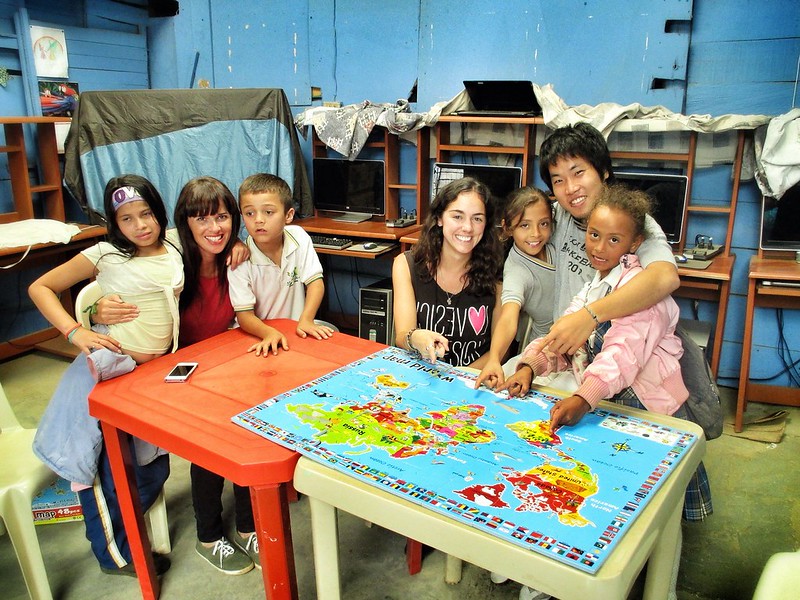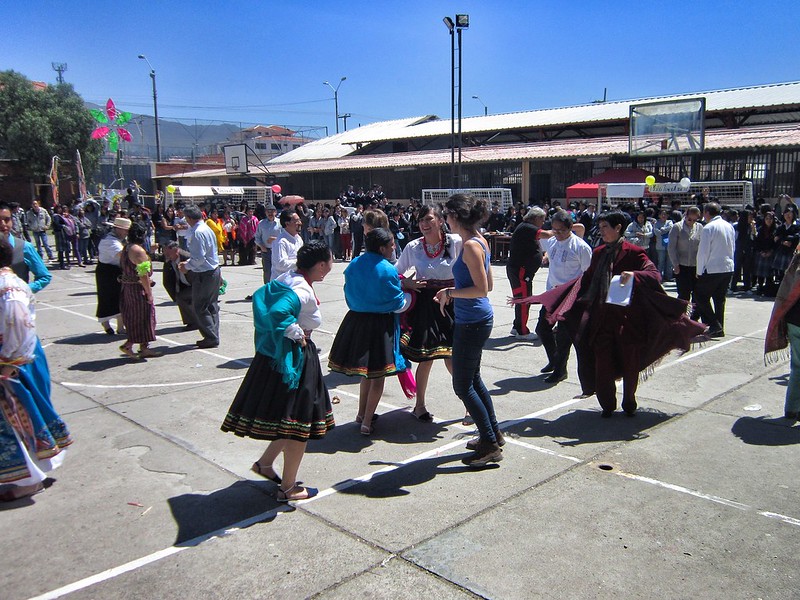I’m on vacation this week, but I’ve left you in the capable hands of some of my favorite bloggers from past BlogHouse events. Today Flora Baker from Flora the Explorer shares some valuable information about volunteering abroad.
My first experience of volunteering abroad was in Kenya. Aged eighteen, I was filled with ideas of saving the world, and on the plane ride over I imagined being welcomed by a family into their home, being handed a trowel and single handedly building a school and teaching English to packed classrooms at the same time.
Instead, I arrived at a compound filled with Australians and Brits, was led into a cavernous tent with a proper bed-frame and ended up spending most of my month being taken to the local beach for sunbathing expeditions and visiting elephant sanctuaries. There were three full days where we actually ‘built’ anything in the local village – and the walls I helped to cover in plaster ended up falling down.
Amazingly enough, a group of Western eighteen year olds with no experience or training in the world of Kenyan labour were more in the way than anything else.
The point of this story? My time in Kenya was a sharp awakening to just how much a volunteer project can deviate from your expectations. Although the program was perfect for most of the people there with me, I realized I actually wanted a more culturally immersive experience; talking, eating and living with locals, getting my hands dirty and really getting involved with a project I could be proud of when I left.
As someone who’s spent the last seven years taking part in all manner of volunteer projects – from chopping coconuts on a Thai permaculture farm to wiping the snot from the noses of Ecuadorian babies – I’ve learnt a thing or two about how to find a volunteer project that works for you.
Contents
The volunteering basics: what, where, and for how long?

First up is narrowing your options down. Although you might love to spend the next year helping out at an orphanage in Nepal, your two-week-holiday-window isn’t going to appreciate either your flight costs or your inability to really connect with those children. The shorter the timeframe you have to play with is, the closer to home your volunteering location will probably be (as a general rule, too, it’s ill advised to volunteer with children for anything less than a few months as they create bonds very quickly).
Next, you’ve got to decide what kind of project you want to volunteer on – and the opportunities really are endless. The best way to decide is to consider what you’d feel most confident about doing: are you more of a people person, or do you adore working with animals? Will you relish daily 5am wakeup calls to help with the farming, or would teaching afternoon computer classes to local adults be more your thing?
Lastly, work out your priorities. For some people, volunteering is a means to an end – like the backpackers who’ve run out of money mid-trip who take up a bar job in their hostel, exchanging pulling pints for daily meals and a bed. There are also those who want to live on a beach in Thailand or deep inside the Ecuadorian jungle by any means necessary – so if there’s a country you really want to visit, and you think it would make your trip more interesting to also do some volunteer work then that’s an equally good reason! In South America, I decided I wanted to volunteer somewhere in each country I travelled through – so I had more of a ‘country first, project later’ kind of mentality.
Capitalize on your skills – or learn some new ones

Playing to your strengths is often forgotten about when volunteering – but it’s the way you’re most likely to make a actual difference. Are you obsessed with the sea, and keenly conscious of marine conservation? Then work at a turtle sanctuary as a research assistant. If you love playing football, you could spend your summer at an overseas camp teaching kids the rules of the game. Did you spend time tutoring young people when you were at school or college? You might have a real knack for teaching – and that’s one of the most popular volunteer jobs for a reason. As the world becomes more inter-connected schools across the globe are increasingly aware that their pupils should speak English, so listening to native speakers is a sacred opportunity. In a tiny school in Nepal, I was involuntarily drafted in as an impromptu ‘English conversation’ teacher – which basically involved me prancing around the classroom pretending to be Harry Potter on a broomstick. I had no teaching experience at that point, but the headmaster was insanely keen to have his students listen to a ‘real’ English voice.
Of course, volunteering also grants you a number of new skills, picked up from the experiences you have during your projects. When I set out for South America, I spoke about three words in Spanish. I vowed to get better, and eighteen months later I’d spent at least ten full months involved in various volunteer projects where I spoke Spanish to local people most of each day, and was essentially fluent. So don’t be afraid to volunteer on a cattle ranch in Argentina when you’ve only ridden a horse a few times; you’ll learn the ropes as you go, and afterwards can boast about all the things you learned as a result of taking the risk.
Know your options – and research, research, research!

There are a huge number of organizations competing to send you around the world on volunteer projects, but they each come with their own price tag. The biggest companies will charge you extortionate fees for ‘volunteer placements’ (or even ‘internships’, which is something of a joke!) and explain it away with in-country representatives and airport transfers, and mainly play on your concerned parents’ worries that you won’t be safe on a project abroad.
On the other end of the volunteering cost spectrum, there are websites like Workaway, HelpX and WWOOF which offer work exchange projects. You help local families with their gardening, building, or farming and get accommodation and meals in return. Each project is different in terms of expected work load and length of time, but you’re likely to have an extremely ‘culturally local’ experience – and have much more freedom to explore the country at your own leisure.
There are plenty of other places to find volunteering projects – here are a handful of the most popular:
Locally based NGOs: most places I’ve volunteered have been through small, local organisations without much online presence. I’ve usually heard of them either by word of mouth, from friends/relatives or when I’ve already been travelling in the country. Obviously it’s less easy to plan for, but it makes you a lot more spontaneous!
Language schools: if you’re planning to learn a new language while travelling then a lot of language schools will combine morning classes with afternoon volunteering programs: usually at local schools, orphanages, or animal shelters. It’s a huge help in the development of your language skills and also means you’re not spending the entirety of each day volunteering, which can be daunting for some people.
Through your school or college: this seems to only be a US phenomenon and something I wasn’t allowed to do at university in England, but volunteering abroad in exchange for academic credit is a great way to contribute to both your degree and resume. It does mean that your volunteering should be vaguely serious (more like teaching English, less like hostel bar work) as colleges have quite a strict judging process for what’s credit-worthy.
Voluntary service: this is a more long-term option as most projects are around the 1-2 year mark – but you’re virtually guaranteed a life-changing experience. Options include the Peace Corps in the US, VSO (Voluntary Service Overseas) in the UK (http://www.vso.org.uk), and CUSO in Canada (http://www.cusointernational.org). You often require a degree and at least 2 years in professional work to qualify. Look through your country’s government website for similar opportunities.
Relief work: like voluntary service, humanitarian work is often reserved for people with professional backgrounds – although a lot of help is needed after natural disasters. Check out The Red Cross, Medecins San Frontiers, Oxfam, and World Concern for more.
Determine what you want to get out of your experience

One of the most fantastic things about volunteering is that people do it because they want to, not because they have to. This goes both ways, though; in order to be a good volunteer, you need to be wholeheartedly committed to your role without feeling petulant that you’re not getting a paycheck for the time you’re putting in.
Some volunteer options, like teaching English, can also be done as an actual job: on the plus side you get paid, but the negative is actually having a job. You’re no longer free to explore at a moment’s notice – instead, you’re dedicating yourself to a 9-5 working day followed by evenings of creating lesson plans. A lot of travelers who like to move slowly and earn money as they go choose this option, becoming expats in their chosen countries, but it’s definitely not the same as volunteering.
Whenever I speak to fellow volunteers about why they love volunteering, I get a similar set of reactions. Meeting and connecting with new people, expanding your horizons, looking at the world in a different way and gaining an understanding of other cultures are all popular reasons to volunteer – plus it’s usually great fun.
One of my favorite reasons to volunteer is that it gives my time in that city or country a very unique focus. When I was younger, I spent aimless weeks in European countries where I did little more than sightsee in the day and go to restaurants and bars at night; while it was great fun, those experiences all often end up blurring together with little distinction. But helping out Bolivian technicians in the workshop of an artificial limb clinic in La Paz, or joking around with Icelandic musicians backstage at a music festival in Reykjavik when I was guarding their dressing rooms? Those are experiences I’ll never forget.
Flora Baker is a freelance writer and traveller. After two years volunteering her way around South America, Flora recently returned to London where she is now pursuing a Masters degree in non fiction writing and chronicling her adventures online at www.FloraTheExplorer.com.
